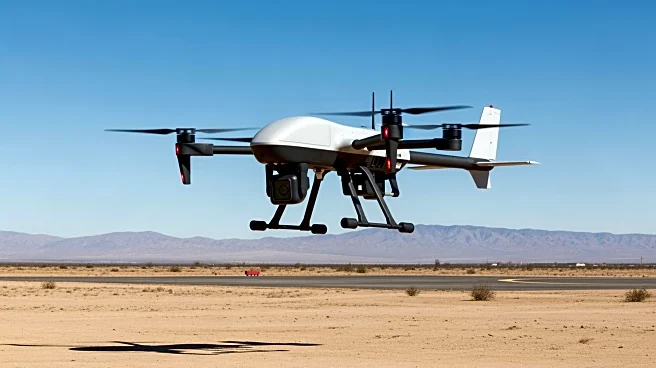What's Happening?
The United States is planning to set up a military presence at an airbase in Damascus to oversee a security pact between Syria and Israel. This move follows the fall of Syria's former leader Bashar al-Assad
and indicates a strategic realignment with the U.S. The base is expected to be part of a demilitarized zone under a non-aggression pact mediated by President Trump's administration. The Pentagon has accelerated plans for the base, conducting reconnaissance missions to ensure its readiness. The U.S. aims to use the base for logistics, surveillance, refueling, and humanitarian operations, while Syria retains sovereignty over the facility. The initiative mirrors other U.S. military presences in Lebanon and Israel, monitoring ceasefire agreements.
Why It's Important?
The establishment of a U.S. military presence in Damascus signifies a significant shift in Middle Eastern geopolitics, potentially stabilizing relations between Syria and Israel. This move could enhance regional security and contribute to the broader U.S. strategy against ISIS. It also reflects the U.S.'s ongoing commitment to maintaining peace in the region, which could lead to economic and political benefits for involved parties. The presence of U.S. forces may deter aggression and foster cooperation, impacting regional alliances and power dynamics.
What's Next?
The U.S. is expected to finalize technical talks regarding the base's operations, with military personnel likely to be dispatched soon. Syria's imminent joining of the U.S.-led anti-ISIS coalition could further solidify this partnership. President Trump is scheduled to meet Syrian President Ahmed al-Sharaa at the White House, marking a historic visit that may influence future diplomatic relations. The outcome of these developments could shape the Middle East's political landscape and affect U.S. foreign policy strategies.
Beyond the Headlines
The U.S. military presence in Damascus could have long-term implications for regional stability and U.S.-Syria relations. It may lead to increased cooperation in combating terrorism and fostering economic growth. However, it also raises questions about sovereignty and the balance of power in the region. The ethical considerations of foreign military presence and its impact on local governance and autonomy are critical aspects to monitor.









